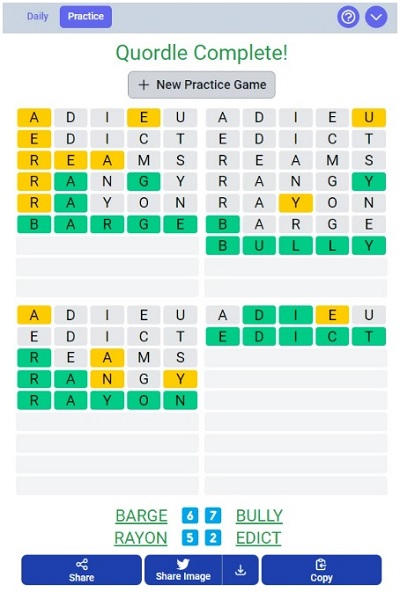I skipped out on Wordle-mania two years ago. The game (in which users get six chances to guess a five-letter word) launched in October 2021. And it took off.
People shared their Wordle successes and strategies on Twitter and Facebook. Companies started creating Slack channels for Wordle so it wouldn’t interfere with messages about actual work. It was almost impossible to make it through the day without seeing a Wordle post.
Wordle was everywhere. By the time The New York Times acquired it for “low seven figures” in January 2022, it had millions of daily players.
I was not one of them. Normally, Wordle is the type of game I would be addicted to. I love the combination of word games and strategy. And when it first started popping up in my Twitter feeds (@vinistic), I was intrigued. But before I could start playing, it went from a few friends posting about it to EVERY friend and acquaintance posting about it. I couldn’t use social media without drowning in Wordle posts. So I refused to play.
I also refused to play the Wordle copycats like Quordle (which lets users solve four Wordle-like puzzles at the same time). I was not participating in this annoying fad.
When The New York Times bought Wordle, I was impressed — and annoyed. It had taken Wordle just four months to get millions of players. Just four months! That’s amazing.
It’s also an incredibly simple game — a variation of games I’ve been playing for years. And I was kicking myself for not inventing it.
After The New York Times bought Wordle, I forgot about the game. It faded (thankfully) from my social media feeds. And life was blissfully Wordle-free again.
That changed this week when I found out Merriam-Webster bought Quordle. Terms of the acquisition were not made public. But I was intrigued. Wordle had the first mover advantage. It rode a wave of popularity to a big payday. It seemed to have the market locked up. Yet Quordle (I finally played a practice round this week) still managed to find success.

Startup investors typically like to focus on first mover advantage. The basic thinking is that by being first to market, a startup gains a head start that is very difficult to overcome. First movers, in theory, keep innovating and building while other startups are still trying to learn the lessons the first mover has already figured out. They should also have time to build a moat that keeps the competition from catching them while they lock up the market. As a result, first movers are the big winners in any space. And everyone else is fighting for table scraps.
Unfortunately, this line of thinking is seriously flawed.
First mover advantages are definitely real. But they’re also overstated. Most sectors are not winner-take-all. Not only is there room for multiple winners, but the market is often set up to have multiple winners.
If there are three startups developing a new drug treatment that none of the big pharma companies are close to matching (it happens more often than you think), it doesn’t really matter who is first to market. The first successful drug will be acquired or licensed by big pharma company A. Big pharma company B needs to compete with company A, so it will license the second drug for big bucks. And big pharma company C will license the third drug to keep up.
Another way to think about this is to look at established sectors and see how they behave. Among the 15 largest alcohol companies, only one has a market cap below $1 billion. The top 27 restaurant chains have market caps above $1 billion. Talk about multiple winners.
Most markets are not winner-take-all. And while the market dynamics differ from sector to sector, the one thing that usually holds true is that there is room for multiple winners in a space. There’s going to be competition. And there’s (usually) going to be multiple winners.
So as you evaluate startups, don’t get hung up on the first mover advantage. As the Wordle/Quordle affair just reminded us, there’s room to compete against even the most successful companies.